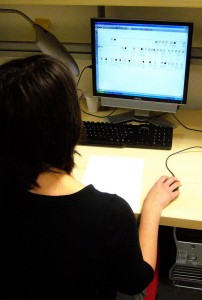Genetic counsellors work as part of a healthcare team. They are skilled at interpreting genetic information, helping individuals and their families make sense out of their genetic risks/test results, and adjust to the effect this information has on their lives (American Medical Association [AMA], 2010). Genetic counsellors help clients to make their own informed decisions by providing unbiased information and support (National Society of Genetic Counselors [NSGC], 2007).
It is central to genetic counselling that all information and support remain non-directive and non-coercive by promoting informed decision making that best suits the client’s wishes. Genetic counsellors collect and interpret family, medical, and psychosocial history. From this information, genetic counsellors can assess a client’s situation and provide education about the risk, prognosis, medical management, diagnostic and prevention options, and testing options (AMA, 2010).
Genetic counsellors can also provide appropriate referrals to other resources, such as other healthcare providers, support groups and specialized services. Typically, genetic counsellors do not maintain a long-term relationship with their clients. Instead, genetic counsellors provide clients with referrals to other services that can provide them with the long-term support they require.
Even though genetic counsellors are highly trained to provide emotional and psychological support to their clients, there are professional limitations as to how far this can go. The National Society of Genetic Counselors (NSGC, 2007) specifies in the ‘Genetic Counselors’ Scope of Practice’, it is the responsibility of the genetic counsellor to “recognize personal limitations in knowledge and/or capabilities and seek consultation or appropriately refer clients to other providers.”
There are various settings in which genetic counsellors can work. This includes hospitals and medical centers, public health agencies, colleges and universities, diagnostic laboratories, biotechnology companies, research institutions, private practice, and governmental agencies (Allied Health Profession, 2005).
Beyond clinical practice, genetic counsellors can consult for diagnostic laboratories, biotechnology companies, and governmental agencies. Genetic counsellors can also be investigators for research studies for research institutions, colleges, and universities. Through public health agencies, genetic counsellors can also be genetics educators to the public and other healthcare professionals.
Additionally, genetic counsellors are well-suited for teaching students. Some genetic counsellors gain college/university lectureship and/or student supervisory roles. Within this capacity, genetic counsellors often educate students from various different healthcare-related fields, such as genetic counselling, medicine, nursing, and social work (NSGC, 2012a).
Practicing genetic counsellors are expected to adhere to professional ethical expectations. Genetic counsellors act as advocates for clients, recognize personal limitations, and respect a client’s right to confidentiality (NSGC, 2007; Canadian Association of Genetic Counsellors [CAGC], 2006).
For more information:
National Society of Genetic Counselors (NSGC) Genetic Counselors’ Scope of Practice
Canadian Association of Genetic Counsellors (CAGC) Code of Ethics
National Society of Genetic Counselors (NSGC) 2012 Professional Status Survey

